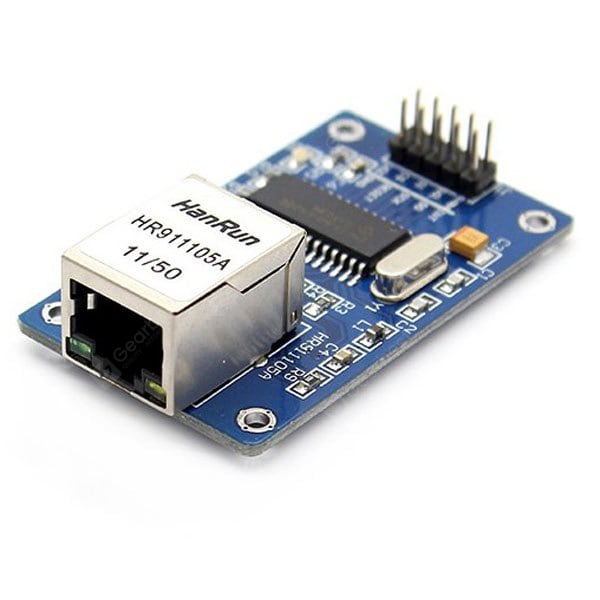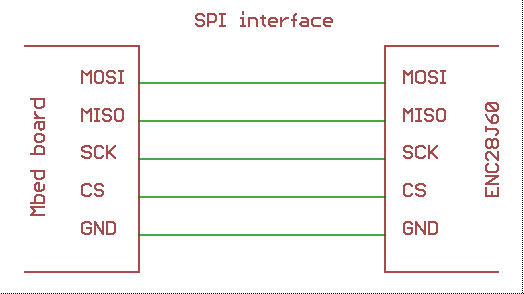EMAC driver for the ENC28J60 Ethernet controller. This is a simplified fork of https://github.com/tobiasjaster/ENC28J60-EMAC-Driver published by Tobias Jaster.
Dependents: MQTT_Hello MQTT_HelloENC28J60
EMAC driver for the ENC28J60 Ethernet controller

This is a fork (the INT and RST pins are not used) of the ENC28J60-EMAC driver published by Tobias Jaster at
https://github.com/tobiasjaster/ENC28J60-EMAC-Driver
Usage:
- Connect the ENC28J60 module to the Mbed board as follows:

- Import (add) this ENC28J60-EMAC library to your program.
- Add a "mbed_app.json" file with the following content to the root directory of your program:
{
"target_overrides": {
"*": {
"platform.callback-nontrivial": true,
"enc28j60-emac.mosi": "D11",
"enc28j60-emac.miso": "D12",
"enc28j60-emac.sck" : "D13",
"enc28j60-emac.cs" : "D10"
}
}
}
- Replace "D11", ..., "D10" with the actual pin names you selected on the Mbed board to be used for the SPI communication.
- To set the MAC address define an array with the desired address bytes and call the "set_hwaddr(mac)" function before calling the network interface "connect" function.
For example:
const uint8_t MAC[6] = { 0, 1, 2, 3, 4, 5 };
EthernetInterface net;
int main()
{
net.get_emac().set_hwaddr(MAC); // set MAC address
if (net.connect() != 0) {
printf("Error: Unable to connect to the network.\n");
return -1;
}
...
enc28j60.h
- Committer:
- hudakz
- Date:
- 2021-03-29
- Revision:
- 3:aa88808326b9
- Parent:
- 0:b599e748252c
File content as of revision 3:aa88808326b9:
/*
* Copyright (c) 2019 Tobias Jaster
*
* Modified by Zoltan Hudak
*
* Licensed under the Apache License, Version 2.0 (the "License");
* you may not use this file except in compliance with the License.
* You may obtain a copy of the License at
*
* http://www.apache.org/licenses/LICENSE-2.0
*
* Unless required by applicable law or agreed to in writing, software
* distributed under the License is distributed on an "AS IS" BASIS,
* WITHOUT WARRANTIES OR CONDITIONS OF ANY KIND, either express or implied.
* See the License for the specific language governing permissions and
* limitations under the License.
*/
#ifndef ENC28J60_ETH_DRV_H_
#define ENC28J60_ETH_DRV_H_
#include "mbed.h"
#include "enc28j60_reg.h"
#include "enc28j60_emac_config.h"
#define ENC28J60_READWRITE 1
/**
* \brief Error code definitions
*
*/
typedef struct
{
uint8_t* buf;
uint16_t len;
} payload_t;
typedef struct
{
uint32_t addr;
payload_t payload;
} packet_t;
/**
* \brief Error code definitions
*
*/
typedef enum
{
ENC28J60_ERROR_OK = 0U, /*!< no error */
ENC28J60_ERROR_TIMEOUT = 1U, /*!< timeout */
ENC28J60_ERROR_BUSY = 2U, /*!< no error */
ENC28J60_ERROR_PARAM = 3U, /*!< invalid parameter */
ENC28J60_ERROR_INTERNAL = 4U, /*!< internal error */
ENC28J60_ERROR_WRONG_ID = 5U, /*!< internal error */
ENC28J60_ERROR_NOPACKET = 10U,
ENC28J60_ERROR_RECEIVE = 11U,
ENC28J60_ERROR_LASTPACKET = 12U,
ENC28J60_ERROR_POSITIONLENGTH = 13U, /*!< internal error */
ENC28J60_ERROR_SIZE = 20U, /*!< internal error */
ENC28J60_ERROR_FIFOFULL = 21U, /*!< internal error */
ENC28J60_ERROR_NEXTPACKET = 22U, /*!< internal error */
} enc28j60_error_t;
/**
* \brief Interrupt source definitions
*
*/
typedef enum
{
ENC28J60_INTERRUPT_ENABLE = EIE_INTIE,
ENC28J60_INTERRUPT_RX_PENDING_ENABLE= EIE_PKTIE,
ENC28J60_INTERRUPT_DMA_ENABLE = EIE_DMAIE,
ENC28J60_INTERRUPT_LINK_STATE_ENABLE= EIE_LINKIE,
ENC28J60_INTERRUPT_TX_ENABLE = EIE_TXIE,
ENC28J60_INTERRUPT_TX_ERROR_ENABLE = EIE_TXERIE,
ENC28J60_INTERRUPT_RX_ERROR_ENABLE = EIE_RXERIE
} enc28j60_interrupt_source;
class ENC28J60
{
public:
ENC28J60(PinName mosi, PinName miso, PinName sclk, PinName cs);
ENC28J60(mbed::SPI * spi, PinName cs);
/**
* \brief Initializes ENC28J60 Ethernet controller to a known default state:
* - device ID is checked
* - global interrupt is enabled, but all irq sources are disabled
* - Establish link enabled
* - Rx enabled
* - Tx enabled
* Init should be called prior to any other process and
* it's the caller's responsibility to follow proper call order.
*
* \return error code /ref enc28j60_error_t
*/
void init(void);
/** This returns a unique 6-byte MAC address, based on the device UID
* This function overrides hal/common/mbed_interface.c function
* @param mac A 6-byte array to write the MAC address
*/
void mbed_mac_address(char* mac);
MBED_WEAK uint8_t mbed_otp_mac_address(char* mac);
void mbed_default_mac_address(char* mac);
/**
* \brief Initiates a soft reset, returns failure or success.
*
* \return error code /ref enc28j60_error_t
*/
enc28j60_error_t softReset(void);
/**
* \brief Set maximum transition unit by Rx fifo size.
* Note: The MTU will be smaller by 512 bytes,
* because the status uses this fixed space.
*
* \param[in] val Size of the fifo in kbytes
*/
void setRxBufSize(uint32_t val);
/**
* \brief Reset PHY
*
* \return error code /ref enc28j60_error_t
*/
enc28j60_error_t resetPhy(void);
/**
* \brief Enable receive
*/
void enableMacRecv(void);
/**
* \brief Disable receive
*/
void disableMacRecv(void);
/**
* \brief Read MAC address from EEPROM.
*
* \param[in,out] mac array will include the read MAC address in
* 6 bytes hexadecimal format.
* It should be allocated by the caller to 6 bytes.
*
* \return error code /ref enc28j60_error_t
*/
enc28j60_error_t readMacAddr(char* mac);
/**
* \brief Write MAC address to EEPROM.
*
* \param[in,out] mac array will include the write MAC address in
* 6 bytes hexadecimal format.
* It should be allocated by the caller to 6 bytes.
*
* \return error code /ref enc28j60_error_t
*/
enc28j60_error_t writeMacAddr(char* mac);
/**
* \brief Check device ID.
*
* \return error code /ref enc28j60_error_t
*/
bool check_id(void);
/**
* \brief Get the data size of the Rx buffer, aka Maximum Transition Unit
*
* \return Fifo data size in bytes
*/
enc28j60_error_t setWritePrt(uint16_t position, uint16_t offset);
enc28j60_error_t transmitPacket(packet_t* packet);
enc28j60_error_t loadPacketInTxBuffer(packet_t* packet);
/**
* \brief Get the free space of Rx fifo in bytes.
*
* \param[in] dev Ethernet device structure \ref enc28j60_eth_dev_t
*
* \return Space available to store received data in bytes
*/
uint32_t getRxBufFreeSpace(void);
/**
* \brief Get the size of next unread packet in Rx buffer, using the peak
* register, which is not destructive so can be read asynchronously.
* Warning: In case of heavy receiving load, it's possible this register
* is not perfectly in sync.
*
* \param[in] dev Ethernet device structure \ref enc28j60_eth_dev_t
*
* \return Size in bytes of the next packet can be read from Rx fifo, according
* to the peek register.
*/
enc28j60_error_t setRxBufReadPtr(uint16_t position);
enc28j60_error_t getPacketInfo(packet_t* packet);
void readPacket(packet_t* packet);
void freeRxBuffer(void);
uint16_t getRecvPointer(void);
uint16_t getWritePointer(void);
void readBuf(uint8_t* data, uint16_t len);
void writeBuf(uint8_t* data, uint16_t len);
uint8_t readReg(uint8_t address);
uint16_t readRegPair(uint8_t address);
void writeReg(uint8_t address, uint8_t data);
void writeRegPair(uint8_t address, uint16_t data);
enc28j60_error_t phyRead(uint8_t address, uint16_t* data);
enc28j60_error_t phyWrite(uint8_t address, uint16_t data);
bool linkStatus(void);
uint8_t readOp(uint8_t op, uint8_t address);
void writeOp(uint8_t op, uint8_t address, uint8_t data);
private:
void _setBank(uint8_t address);
void _read(uint8_t cmd, uint8_t* buf, uint16_t len, bool blocking);
void _write(uint8_t cmd, uint8_t* buf, uint16_t len, bool blocking);
#ifdef ENC28J60_READWRITE
void _readwrite(uint8_t cmd, uint8_t* readbuf, uint8_t* writebuf, uint16_t len, bool blocking);
#endif
SPI* _spi;
Mutex _SPIMutex;
DigitalOut _cs;
uint8_t _bank;
bool _ready;
uint32_t _next;
};
#endif /* ENC28J60_ETH_DRV_H_ */